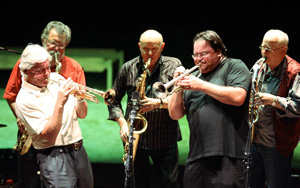Words & Photography ©Laurence Svirchev. First publication 2005
Founded by Alexander von Schlippenbach in 1966, Globe Unity has one of the more intriguing approaches to improvising. Making a coherent musical statement with eleven improvising musicians is a formidable undertaking yet Globe Unity’s tackles the task with aplomb.
Globe Unity Schlippenbach told me in Lisbon, “We have these tutti parts where everybody plays together and we have the solo parts. Every player in the band is also a solo player. The music is arranged so everyone can solo. It’s a simple form. And it developed into something that really works.” Any individual or group of individuals have the ability to step forward at will.
This dynamic was easily heard when trombonist Paul Rutherford reduced the music from a frenzied period by making single note statements at ballad tempo. His articulation was slow and without pyrotechnics. He took the explosive force out of the previous section and built a low intensity statement. Until this point, the audience had been concentrating on the music silently, but at the end of Rutherford’s solo they erupted into applause.
 Jean Luc Cappozzo was playing for the first time with the band, and he and fellow trumpeter Manfred Schoof appeared to spend as much time laughing and enjoying the rest of the band as actually playing. But at roughly the 85% mark of the 85 minute concert, the two stepped forward as naturally as if there were a chart in front of them for a duet improvisation that raised the intensity of the music by several notches. From my listening post I kept wondering when the music would flag but it never did. The contrasts in the music were omni-present, typically expressed as incremental progressions of intensity. These extended transition points demonstrated that not only were the musicians superb soloists, but that they were also hyper-aware of ensemble dynamics and sensibilities. And that kept things interesting.
Jean Luc Cappozzo was playing for the first time with the band, and he and fellow trumpeter Manfred Schoof appeared to spend as much time laughing and enjoying the rest of the band as actually playing. But at roughly the 85% mark of the 85 minute concert, the two stepped forward as naturally as if there were a chart in front of them for a duet improvisation that raised the intensity of the music by several notches. From my listening post I kept wondering when the music would flag but it never did. The contrasts in the music were omni-present, typically expressed as incremental progressions of intensity. These extended transition points demonstrated that not only were the musicians superb soloists, but that they were also hyper-aware of ensemble dynamics and sensibilities. And that kept things interesting.
 One more point: the instruments are arranged strategically. Drummer Paul Lytton occupies the typical center-rear position, allowing a good sight-line and proximity to pianist von Schlippenbach. Drummer Paul Lovens is the stage-left outlier, and that provide him with a good sight-line to the horns’ solo mike. Globe Unity consciously does not employ a bass player. The bottom-end is well-supplied by Lytton and Lovens. There is a reason Globe Unity has maintained itself for almost forty years: an ineluctable ability to make music of the highest order. This was one of the superior concerts that I have heard anytime, anyplace.
One more point: the instruments are arranged strategically. Drummer Paul Lytton occupies the typical center-rear position, allowing a good sight-line and proximity to pianist von Schlippenbach. Drummer Paul Lovens is the stage-left outlier, and that provide him with a good sight-line to the horns’ solo mike. Globe Unity consciously does not employ a bass player. The bottom-end is well-supplied by Lytton and Lovens. There is a reason Globe Unity has maintained itself for almost forty years: an ineluctable ability to make music of the highest order. This was one of the superior concerts that I have heard anytime, anyplace.
The concert was dedicated to the extraordinary trombonist Albert Mangelsdorf, who had died two weeks prior to the Lisbon date.
